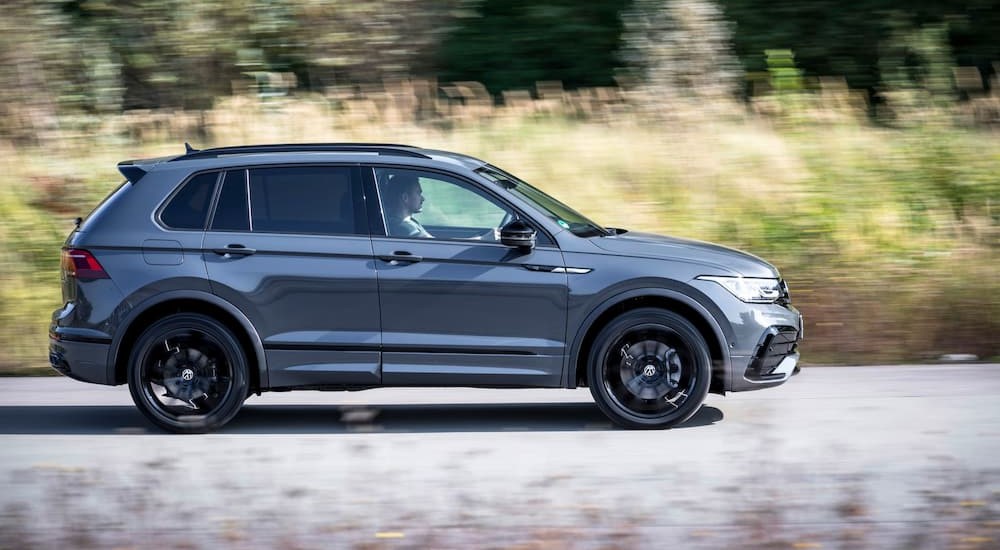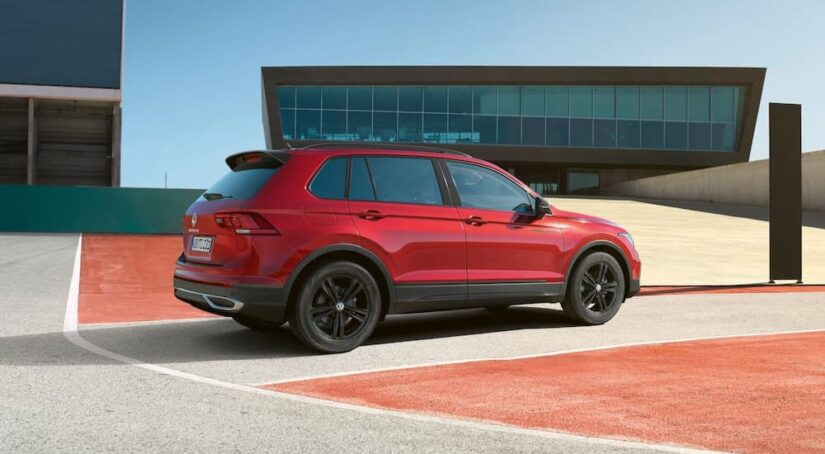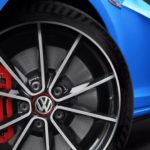If you’re looking into the safest vehicles on the market, then you’ve undoubtedly come across the Volkswagen Tiguan. Volkswagen has historically shined in the safety department. But this attractive compact SUV, in particular, packs a lot of punch for its modest MSRP. In addition to a solid fuel economy that should save you some bucks at the pump, a surprising towing capability of 1,146 lbs, and a sporty turbo engine, it is, above all else, a super safe vehicle. In fact, the Insurance Institute for Highway Safety (IIHS) named it a Top Safety Pick for 2023.
The Tiguan earned the highest possible rating from the IIHS in the categories of head restraints, seats, roof strength, and small overlap front tests on the driver and front passenger side. Plus, it earned a superior rating for vehicle-to-vehicle front crash prevention. The bottom line is, if safety is your top priority in your car shopping process, you should definitely consider a VW Tiguan for sale.
Many vehicles today share a similar suite of features that enhance safety. So, you might be wondering what puts the Tiguan a cut above the rest. It’s more than the collision-mitigating Front Assist and the course-correcting Lane Assist. The designers over at Volkswagen did create a handful of features that make all the difference in the event of a true emergency—even after a crash has occurred. If you have ever been in a car accident, then you know how the value of a vehicle that can minimize damage in such a situation. Here are advanced safety features that make the Tiguan stand out against its competition.
The Intelligent Crash Response System
Should you get into an accident severe enough that the airbags deploy, the Intelligent Crash Response System will activate, and what happens next can substantially minimize the aftermath of your accident.
First, this system will turn off your fuel pump. If you are in an accident and there are flames, or there is the risk of flames, keeping the fuel pump on can create a serious hazard. It’s not fun to talk about, but if you’ve known of cars that blew up after an accident, the fuel pump was likely still running, and that was the cause. This system understands when a collision has occurred and it immediately shuts off the pump to reduce the risk of a fire.
This system also unlocks all of the doors. If you get into a crash and are able to safely exit the vehicle, it’s important to do so in case the inside of the car has become a hazardous place. After the emotional trauma and confusion of a car accident, you might not be able to locate or even utilize the car door locks. Additionally, you might be in a position such that accessing the unlock button is impossible—especially if it has been compromised in the accident. This feature will unlock the doors in the event of a collision, so all you need to worry about is getting out.
Furthermore, if emergency personnel arrive at the scene and need to remove you from your car, it’s easiest if the doors are unlocked. This reduces the chances that they need to smash in the windows or remove the doors to get you out.
If you get into an accident after sundown, other vehicles might not notice your car stopped in the street—especially if the accident damaged your headlights. This puts you at risk of enduring a second collision. So, the Intelligent Crash Response System activates your hazard lights after an accident so that other vehicles can spot you and know to slow down. These three features—the automatic door unlock, turning off the fuel pump, and activating your hazard lights—will have a tremendous impact on the moments directly after a collision and can keep a bad moment from getting worse.
A Safety Cage to Protect You From Impact
The Tiguan also has a best-in-class safety cage. What this means is that it has crumple zones at the front and back of the vehicle shell. A crumple zone is engineered to absorb the majority of impact in a crash, so—in a collision—most of the impact will be distributed amongst these crumple zones instead of threatening the passenger area. This reduces the chances that the actual occupant cell—the area where the passengers and drivers sit—suffers damage.
If you’ve ever seen a Tiguan after a crash, you might have noticed that the area that was hit—either the front or the back—looked very badly damaged. While this can be shocking to see, it’s actually a good sign—it means the crumple zones did their job, and the passenger cell did not take the impact. Volkswagen put this safety cage through extensive testing to ensure it measures up in the event of severe impact. The IIHS also gave the safety cage its best possible rating.

Automatic Post Collision Braking
You already know that the Tiguan does several things in the moment directly following a collision to enhance your safety, like turning off the fuel tank and activating your hazard lights. This is something else it does right after a crash has been detected: it applies the brakes.
Once a crash has occurred, for a number of reasons, you might be unable to control your brakes. You might be unconscious or go numb in your legs. And not every crash brings a car to a total stop, which means you could be at risk for even further damage after the initial collision. This system will automatically slow and even stop your vehicle after a crash to minimize residual damage.
In some accidents, the worst damage happens after the initial crash because of a vehicle’s failure to respond to the incident. The Tiguan is designed to automatically activate a string of commands to reduce the chances that damage worsens after a collision.
Accidents Are Scary, But the Tiguan Is Here to Help
Even excellent drivers get into accidents. You might have the best behaviors on the road, but you cannot control what others do. From drunk drivers to distracted drivers to road ragers, there are a lot of people on the road who can pose a risk to you and your family. So the first thing you can do to enhance your safety on the road is to be a good driver. The second thing you can do is buy one of the safest vehicles on the market. The Tiguan is such a vehicle.
If you’ve ever suffered a car crash, you understand the trauma that can result. But you also might have learned firsthand that some of the worst damage isn’t caused by the crash itself but by what happens after, like a fire or another car running into your stalled vehicle. The safety features of the Tiguan were made with these real-life risks in mind. Knowing that these systems are here can give you peace of mind. Hopefully, you never have to use them—but, like an insurance policy, it’s better to have it and never need it than to need it and not have it.



